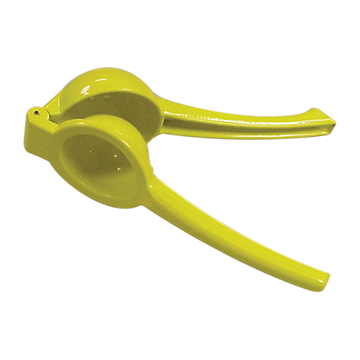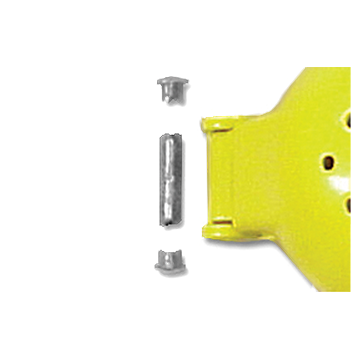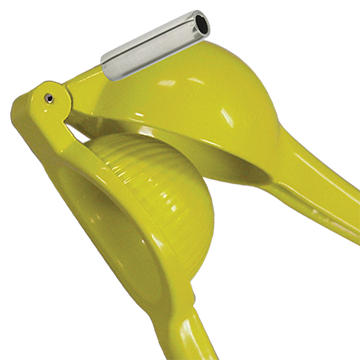Lemon-Lime Press
Application:
The customer manufactures and distributes quality kitchen utensils. The lemon-lime juicer they make is composed of two enamel covered zinc die castings that are pinned together. The original design utilized a semi-tubular aluminum Rivet as the hinge pin.
The aluminum Rivet is softer than the housing material and wears during normal use of the juicer. Radial grooves are cut into the aluminum Rivet at the point of contact with the host material. These grooves weaken the strength of the Rivet. The aluminum Rivet wore really quickly if the holes in the die castings were not aligned. The wear and/or hole misalignment resulted in a premature failure during use of the juicer, and actually failed while in the consumer’s hand. These quality failures negatively impacted the quality image under which this customer markets it products.
Another quality issue with the use of a Rivet in this soft assembly was a result of the fact that Rivets require secondary operations to head (or “clinch”) the parts in order to hold the assembly together. At times, the juicer assembly was bent, chipped or otherwise damaged during this “clinching” process. The cost associated with the secondary clinching operation and scrap resulted in lower profits.
SPIROL Solution:
SPIROL Engineering recommended the replacement of the aluminum Rivet with a stainless steel Coiled Spring Pin.
The specified SPIROL Coiled Pin, #39368 (CLDP .125 X 1.375 MCK), provides several performance benefits over the aluminum Rivet. The double shear value of a 5056 aluminum Rivet is approximately 650 lbs. The Coiled Pin offers a minimum double shear value of 1,400 lbs – a significant improvement over the Rivet. A hardened 420 stainless steel pin does not wear during constant contact with the host material. The SPIROL Coiled Pin continues to flex after insertion, so stresses are distributed equally throughout the pin and hole. Shock and vibration are absorbed by the pin – reducing wear on all components. A reduction in wear and increased shear strength provides a higher quality and longer life for the product. Moreover, stainless steel is approved for use in food preparation equipment.
The Coiled Pin eliminated the need for a riveting (or “clinching”) operation which therefore reduced the cost of assembly. Since the clinching operation was removed, this also resulted in the elimination of scrap caused by broken and chipped components. The SPIROL Coiled Pin enabled the customer to sell a better product at a higher profit margin, without increasing their price to market.
Complimentary Applications Engineering Support: SPIROL Engineers will review your application needs and work with your design team to recommend the best solution.
Additional Resources
Why Should You Partner with SPIROL?
Our core purpose is to be a resource that facilitates the reduction of your assembly costs, improves your product quality and enhances your overall competitiveness. In addition, SPIROL offers:



 LOCATIONS
LOCATIONS USA
USA  Canada
Canada  United Kingdom
United Kingdom  Deutschland
Deutschland  México
México  Brasil
Brasil  Česká republika
Česká republika  France
France  España
España  한국
한국 

